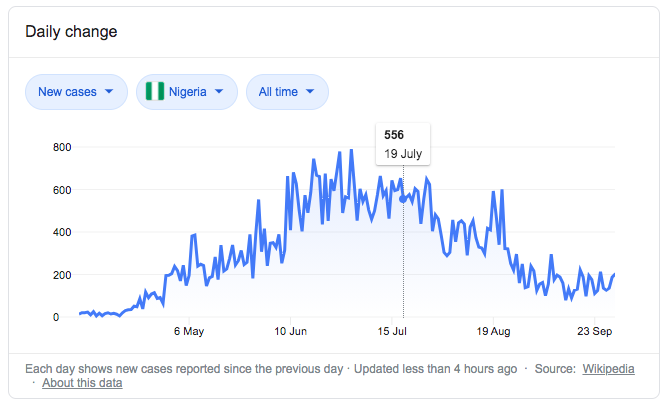But while the number of confirmed cases of COVID-19 continues to drop in Nigeria, deaths continue to be recorded as the number of COVID-19-linked deaths in Nigeria has neared 1,100 on Friday 18 September 2020.
In the middle of the pandemic when Nigeria was recording hundreds of cases daily with tens of deaths, most citizens were on alert and were abiding with the recommended guidelines. But experts argued that as the number of cases and deaths lowered and citizens realised that COVID-19 was not as severe as Ebola, they began to relax.
In Oyo state, one of the early confirmed cases of COVID-19 was among the security officials issuing passes at the gates leading to the premises of the University College Hospital (UCH) Ibadan. As a preemptive and protective measure, the institution’s administration changed from reissued plastic passes to one-time disposable paper passes.
Back then, it was almost impossible for a visitor to gain entry into the hospital premises without wearing a face mask. But a recent visit to the hospital suggested that measures have been relaxed as it is now possible to gain entry without a face mask.
While several restaurants have resumed dine-in services, there are now several restaurants that a customer can gain entrance into without washing hands or face masks largely due to inconsistencies in adhering to guidelines and sub-optimal enforcement of regulations.
Considering these developments are not lost on the citizens, some are suggesting that Nigeria had already attained the goal of its pandemic control which is to flatten the epidemic curve. But Dr Chinwe Owu, Acting Director, Prevention Programmes and Knowledge Management at the NCDC, noted that for Nigeria to declare a flattening of the curve, there has to be an increased number of testing resulting in the detection of fewer cases.
But as it is, we've noticed a progressive decline in testing rates across various states which is a result of lower sample collection rates. In the month of August we discovered that testing rates declined by up to 36% while test positivity has also declined by about 25%, Owu said.
For Nigeria to be sure that there is actual flattening of the curve or actual decline in the number of cases and not a pseudo decline, she said more people need to be tested.
The country needs to test at least as many people as we have tested before and maintain that level of testing or even improve our level of testing on a daily basis and show that steady decline in the number of cases before we can truly say that we are flattening the curve,Owu said.
Without mincing words, Owu said the pandemic is not yet over and the threats remain thus necessitating the need for people to remain alert.
As it is currently, COVID-19 is still very much with us in the country. The response to this outbreak is a marathon but it is a marathon we can win. We can only win if collectively we all observe the prescribed public health and social measures of maintaining regular hand hygiene, washing our hands frequently with soap under running water, [and]wearing face masks whenever we are in public spaces,” Owu said.
What to do going forward
Ogunniyi Abiodun, infection prevention and control expert at the NCDC stressed the importance for Nigerians to stay on guard and not grow weary in the light of the milder-than-predicted state of the pandemic in Nigeria and other African countries.
Instead of relaxing measures, the emergence of social distancing and improved hygiene are indications that Nigeria also stands the chance of combating several other similarly transmitted infections that personal hygiene can help with.
Perhaps the major lesson that circumstances surrounding the uneven and non-uniform adherence to COVID-19 measures have taught the country is that no single agency is responsible for fully ensuring that Nigerians comply with recommended measures. As agencies issue guidelines, governments at state and local levels are expected to enforce it even as establishments are required to do their parts by complying and refusing services to customers that do not want to comply.
Going forward, the initial measures and aggressiveness that Nigeria started the control of the pandemic are much needed now that the country has reopened fully because the only thing that will ensure that lives are not lost and the national economy does not take another hit is how serious everyone plays their roles.

 Considering almost every aspect of the Nigerian economy has reopened, it's tempting to assume that the COVID-19 pandemic is over. FYI, it's not. Paul Adepoju reports on
Considering almost every aspect of the Nigerian economy has reopened, it's tempting to assume that the COVID-19 pandemic is over. FYI, it's not. Paul Adepoju reports on 




